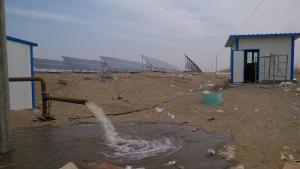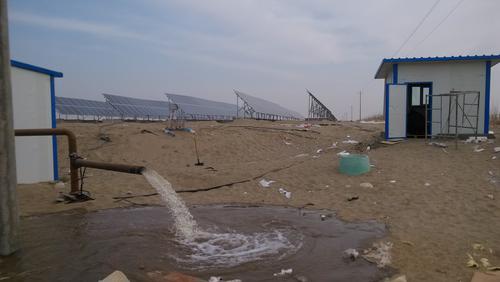Poseidon Solar Pump Inverter - Kusum Solar Pump Yojana Compatible
- Loading Port:
- China Main Port
- Payment Terms:
- TT OR LC
- Min Order Qty:
- -
- Supply Capability:
- -
OKorder Service Pledge
OKorder Financial Service
You Might Also Like
Hefei poseidon solar pv pump co., ltd is a leading supplier of inverter for the Solar PV pump market. Lead by veterans from the solar and semiconductor, our combines advanced and patented PV inverter technology, proprietary Power Line Communications (PLC) technologies, and well managed manufacturing capabilities to offer its customers with PV inverter systems that are more productive, more reliable, and more intelligent – increasing the energy harvest of solar panels . We participate in formulate a series of national standards,like< Photovoltaic pumping system>(NB/T32017-2013) and <General specifacitions for PV trickle irrigation system>
Based on its several years’ R&D, technical and market experience, under the domestic and foreign advanced management concepts, we have launched series of solar pv pump inverters.
By its complete system, the superior performance-to-price ratio and the formidable universality, our product widely applies in the fields of agriculture.
- Q: Can a solar pump be used in areas with high levels of nitrites in the water?
- Yes, a solar pump can be used in areas with high levels of nitrites in the water. The function of a solar pump is to move water, and it does not directly affect the quality or composition of the water. However, it is important to note that a solar pump will not remove or reduce nitrites from the water. Therefore, appropriate water treatment methods should be employed to address the high nitrite levels before utilizing the solar pump.
- Q: How does the angle and orientation of solar panels affect the performance of a solar pump?
- The performance of a solar pump is greatly affected by the angle and orientation of the solar panels. The angle determines the amount of sunlight received, while the orientation dictates the direction the panels face. Efficiency of solar panels is determined by the angle at which they are installed, as this affects the amount of sunlight they can capture. Sunlight is converted into electricity by solar panels, and the tilt angle determines the quantity of sunlight captured. The optimal angle is dependent on the geographical location of the solar pump. For example, regions near the equator benefit from a flat or low tilt angle to maximize sun exposure year-round. Conversely, higher latitudes require a steeper tilt angle to compensate for lower sunlight intensity. Orientation refers to the direction solar panels face, usually either south or north depending on the hemisphere. In the Northern Hemisphere, south-facing panels capture the maximum sunlight. By facing south, panels receive sunlight for the longest duration during the day. Similarly, in the Southern Hemisphere, north-facing panels provide optimal performance. The angle and orientation of solar panels also influence the angle of incidence, which is the angle at which sunlight strikes the panel surface. Maximum efficiency is achieved when sunlight strikes the panels perpendicularly. If the angle of incidence is too high or low, panel efficiency decreases. Adjusting the tilt angle and orientation optimizes the angle of incidence, maximizing energy output from the solar pump. In conclusion, the angle and orientation of solar panels are crucial in determining the performance of a solar pump. By adjusting these factors based on the geographical location, it is possible to optimize sunlight capture and maximize the efficiency of the solar pump.
- Q: Can a solar pump be used for water supply in schools or community centers?
- Certainly, a solar pump can be utilized for water supply in schools or community centers. Solar pumps offer a dependable and sustainable solution for water supply by utilizing solar energy to extract water from wells, rivers, or other sources. They prove particularly suitable for areas with limited electricity access or an unreliable power grid. Installation, operation, and maintenance of solar pumps are effortless. They function without the need for fuel or electricity, which makes them both cost-effective and environmentally friendly. This quality also enables their usage in remote areas without access to grid electricity. Within schools or community centers, solar pumps can be employed to ensure a consistent water supply for various purposes, including drinking, sanitation, and irrigation. By pumping water into storage tanks, they guarantee a continuous and hygienic water supply for the community. Moreover, solar pumps can be integrated with other water treatment systems, for instance, filtration or purification units, to guarantee the safety of the supplied water for consumption. This renders them an ideal solution for addressing water scarcity and enhancing access to clean water in schools and community centers.
- Q: Can a solar pump be used in areas with limited access to local suppliers for replacement parts?
- Yes, a solar pump can be used in areas with limited access to local suppliers for replacement parts. Solar pumps are designed to be durable and require minimal maintenance. They typically have few moving parts, reducing the need for frequent repairs or replacements. Additionally, solar pumps often come with long warranties and can be serviced by authorized technicians even in remote areas. Therefore, they are an ideal solution for locations with limited access to local suppliers for replacement parts.
- Q: Can solar pumps be used for water supply in vineyards or wineries?
- Yes, solar pumps can indeed be used for water supply in vineyards or wineries. Solar pumps are an eco-friendly and cost-effective solution that can effectively provide water for irrigation, thereby supporting the growth and health of vineyards. Additionally, solar pumps help reduce reliance on traditional electricity sources, making them a sustainable choice for the agricultural sector.
- Q: How does a solar pump handle water with high levels of arsenic or other toxins?
- A solar pump alone cannot directly handle water with high levels of arsenic or other toxins. However, there are additional treatment methods that can be combined with a solar pump system to address water contaminated with arsenic or other toxins. These treatment methods may include technologies like activated carbon filters, reverse osmosis, or other specialized filtration systems. These additional treatment steps can effectively remove or reduce the levels of toxins, ensuring safe and clean water for various purposes.
- Q: How does a solar pump handle water source contamination from paper or pulp mills?
- A solar pump, like any other pump, does not have the ability to handle water source contamination from paper or pulp mills. The pump's primary function is to extract water from a source and deliver it to a desired location. Dealing with water contamination requires appropriate filtration or treatment systems specifically designed to remove the pollutants caused by paper or pulp mills.
- Q: What is the role of sensors in a solar pump system?
- The role of sensors in a solar pump system is to monitor and measure various parameters such as water level, temperature, pressure, and flow rate. These sensors provide crucial data that helps to optimize the performance and efficiency of the system. By continuously monitoring these parameters, sensors can ensure that the pump operates within safe limits, prevent damage or malfunction, and enable intelligent control and automation of the system.
- Q: Can a solar pump be used for water supply in a commercial building?
- Yes, a solar pump can be used for water supply in a commercial building. Solar pumps are increasingly being adopted for commercial buildings due to their energy efficiency and cost-effectiveness. They harness solar energy to power the pump, eliminating the need for grid electricity and reducing operating costs. Solar pumps can provide a reliable and sustainable water supply solution for various applications such as irrigation, plumbing, and water circulation in commercial buildings.
- Q: Are solar pumps suitable for both residential and commercial use?
- Solar pumps are suitable for both residential and commercial use, offering a great deal of versatility. They can be utilized for irrigation, water supply, and other fluid management tasks. Both individuals and businesses can benefit from solar pumps as they provide several advantages. The first advantage is their environmental friendliness. By using clean and renewable energy from the sun, solar pumps help reduce carbon emissions and decrease reliance on non-renewable energy sources. This makes them an excellent choice for those who want to adopt sustainable practices. Furthermore, solar pumps can lead to significant long-term cost savings. Although the initial investment may be higher compared to traditional pumps, solar pumps have minimal operating and maintenance expenses since they do not require fuel or electricity to function. This can result in substantial utility bill savings for both residential and commercial users. Moreover, solar pumps are highly reliable and efficient. They can operate independently of the electrical grid and can be installed in remote areas where electricity access may be limited or expensive. Additionally, solar pumps have low maintenance requirements, with many models designed to work for several years without major servicing or component replacements. Lastly, solar pumps offer scalability, meaning they can be customized to meet the specific needs of both residential and commercial users. Whether it's a small residential garden or a large-scale agricultural or industrial operation, solar pumps can be sized and designed accordingly. In conclusion, solar pumps are a viable choice for both residential and commercial use. Their environmental benefits, cost-effectiveness, reliability, and scalability make them an appealing option for individuals and businesses seeking to harness the power of the sun for their pumping requirements.
Send your message to us
Poseidon Solar Pump Inverter - Kusum Solar Pump Yojana Compatible
- Loading Port:
- China Main Port
- Payment Terms:
- TT OR LC
- Min Order Qty:
- -
- Supply Capability:
- -
OKorder Service Pledge
OKorder Financial Service
Similar products
Hot products
Hot Searches
Related keywords


























